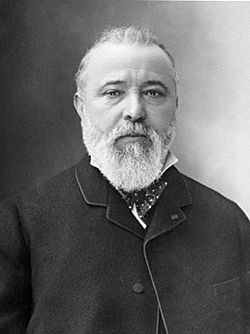Zenobe Gramme facts for kids
Quick facts for kids
Zénobe Gramme
|
|
|---|---|

Zénobe Gramme in 1893
|
|
| Born | 27 April 1827 Jehay-Bodegnée, Belgium
|
| Died | 20 January 1901 (aged 74) Bois-Colombes, France
|
| Resting place | Père Lachaise Cemetery |
| Nationality | Belgian |
| Occupation | electrical engineer |
| Known for | Gramme dynamo |
Zénobe Théophile Gramme (born April 4, 1826, in Amay, Belgium – died January 20, 1901) was a clever Belgian electrical engineer. He is famous for inventing the Gramme machine. This machine was a special kind of direct current dynamo. It helped make electricity much more useful for everyone.
Contents
Who Was Zénobe Gramme?
Zénobe Gramme was born in a small town in Belgium. From a young age, he was interested in how things worked. He became an engineer, which means he designed and built machines. His work changed how we use electricity.
The Amazing Gramme Dynamo
Before Gramme, people knew how to make electricity. But the machines, called dynamos, were not very good. They often made electricity that was jumpy or not strong enough.
Gramme's big invention was the Gramme machine, also known as the Gramme dynamo.
- It made electricity that was much smoother. This is like a steady flow of water instead of splashes.
- It could create much higher voltages. This meant more powerful electricity.
How the Dynamo Changed Things
Gramme's dynamo was a huge step forward. It made it possible to power things like:
- Electric lights in homes and streets.
- Electric motors in factories.
- Other machines that needed a strong, steady supply of electricity.
His invention helped start the age of electricity. It made electricity practical for everyday use. This changed industries and daily life around the world.
Images for kids
See also
 In Spanish: Zénobe Gramme para niños
In Spanish: Zénobe Gramme para niños
 | Janet Taylor Pickett |
 | Synthia Saint James |
 | Howardena Pindell |
 | Faith Ringgold |




